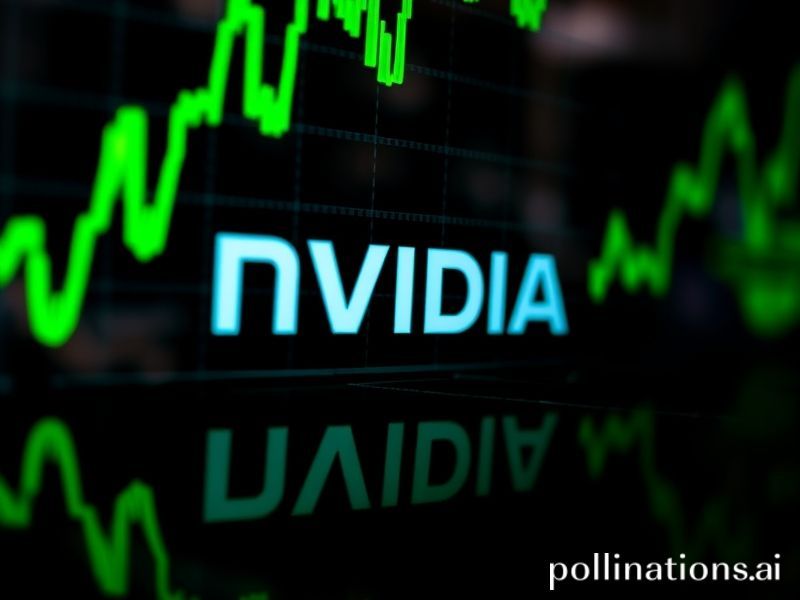NVIDIA Stock: The Global Religion Nobody Asked For, Everyone Bought
NVIDIA: The Unofficial Reserve Currency of Planet Earth
By Our Correspondent in Low-Earth Orbit (because the rent is cheaper up here)
TOKYO—There’s a moment every Tokyo salaryman recognizes: the 7:12 a.m. Yamanote Line lurches forward, and suddenly every smartphone screen turns the same shade of radioactive green—NVIDIA’s intraday chart. Commuters who can’t pronounce “Jensen Huang” still mouth the ticker like a prayer: NVDA, NVDA, NVDA. In a country that once revered the kami of rice and steel, the new deity is a semiconductor that teaches machines to hallucinate cat videos in 4K.
From the glass towers of Shanghai to the bazaars of Mumbai, NVIDIA has become the Esperanto of greed. The stock has tripled in a year, shrugging off recessions, invasions, and the occasional congressional hearing like a cat ignoring a dying houseplant. Analysts—those modern court astrologers—now justify 60× earnings multiples with the same solemnity medieval monks reserved for transubstantiation. “Generative AI is the new electricity,” they chant, apparently unfazed that electricity eventually electrocuted a few people.
In the European Union, where regulators still believe antitrust fines are scarier than gravity, NVIDIA’s rise is treated like an American invasion by other means. Brussels has opened three probes, each more existential than the last. Meanwhile, German auto executives—who spent decades perfecting the art of diesel obfuscation—now prostrate themselves before Huang, begging for a few hundred H100 GPUs so their self-driving cars can finally stop mistaking cyclists for tumbleweeds. The irony is artisanal: the continent that once colonized the world with gunpowder now begs Silicon Valley for silicon.
Down in São Paulo, fintech bros with Patagonia vests (yes, they have winter too) trade NVIDIA call options in between sips of overpriced açaí. Brazil’s real may swing like a drunken samba, but NVDA is the one asset that never catches dengue. Local legend claims one quant fund converted an entire rainforest’s worth of carbon credits into GPU futures; environmentalists cried, then quietly bought the dip.
Across the Arabian Peninsula, petrostates that once diversified into football clubs are now diversifying into neural networks. Rumor has it the Saudis are building a data center so large it will require its own royal family. Somewhere in Riyadh, a prince is asking if they can IPO the air-conditioning bill.
Of course, every planetary obsession needs a villain. Enter China, whose government has banned NVIDIA’s top-tier chips while simultaneously smuggling them in by the suitcase. The customs declaration forms now contain poetry: “One (1) birthday cake, assorted GPUs concealed in fondant.” Beijing’s official line is “technological self-reliance,” which is Mandarin for “please sell us your GPUs until we figure it out.”
Humanitarian organizations, ever the buzzkill, point out that training a single large language model uses enough electricity to power a mid-sized African nation. But the UN Security Council is too busy drafting strongly worded letters about other crises, and let’s be honest, none of them know what a transformer is unless it explodes.
Back in Washington, lawmakers who still think TikTok is a clock sound app are drafting bills to “secure the AI supply chain.” Their legislative text reads like a ransom note written by Siri. The Pentagon, meanwhile, has requisitioned so many GPUs that Call of Duty now lags on military bases.
Conclusion:
NVIDIA is no longer a company; it’s the collateralized debt obligation of human ambition. We’ve stapled our pensions, our national security, and our collective delusions of grandeur onto a chip the size of a communion wafer. The stock may dip tomorrow—gravity is the last free market—but the faith will remain. After all, in a world where truth is fungible and democracy runs on retweets, the only thing more powerful than an omniscient algorithm is the margin loan used to buy it.
Sleep tight. The singularity is leveraged 40-to-1.







